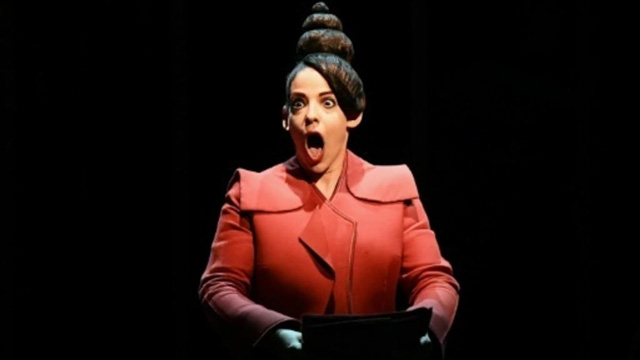
Aix-en-Provence, France | AFP | It features an Israeli prime minister, Palestinian prisoners on hunger strike, a hit squad and a Shin Beth spy chief.
But this is not another story on the intractable Israeli-Palestinian conflict but an opera unusually with a libretto in Hebrew, the official language of Israel.
“The Sleeping Thousand”, an opera by Israeli composer Adam Maor with the libretto by Yonatan Levy, was premiered at the prestigious Aix-en-Provence opera festival in southern France this month.
“This opera speaks of oppression and above all, its impact on the oppressor,” Maor told AFP.
“While I’m not trying to campaign through my art, it is definitely a political opera which raises questions about freedom,” he added.
The chamber opera, which lasts one hour, won critical praise, with the Le Monde daily saying Maor and Levy had “created a singular universe — one which is seductive and provocative and mixes a political fable, philosophical tale and a fictional parable — around the intractable Israeli-Palestinian conflict”.
Maor is hugely critical of Israel’s policies towards the Palestinians and spent two years behind bars for refusing to do his compulsory military service in protest at the “immorality of the occupation” of the Palestinian territories.
– ‘I chose prison’ –
In the opera, which inhabits a world between science fiction and fantasy, a thousand Palestinian prisoners begin a hunger strike generating widespread media interest.
The Israeli government decides to sedate them “so that the world can move on to something else”.
“It works very well until the day when the Israelis start having nightmares and wake up in the night speaking Arabic,” explained Maor, 36.
One day, the government concludes that the Palestinians were seeking to sabotage Israeli dreams.
“They are tunnelling into the world of Jewish dreams and carrying out terror attacks!” declares an aide to the prime minister in the opera.
The prime minister then decides to send in the aide as a spy in Palestinian garb to kill them.
The different characters, all of them Israelis, are taken on by four singers. And at the back of the stage are the “sleeping” Palestinians, all played by volunteers lying on beds.
Referring to his own stint in jail, Maor said: “I chose to go to prison, whereas they (the Palestinians) didn’t.”
Thousands of Palestinians are held by Israel, some without charge under so-called administrative detention orders. They often go on hunger strike to highlight their plight.
Israel insists such detentions are necessary to punish criminals who carried out or planned violent acts, and ensure the Jewish state’s security.
– ‘Find the origins’ –
There have been just a handful of contemporary stage productions that have touched upon the conflict and they never failed to be controversial.
The great American modern composer John Adams, in his 1991 opera “The Death of Klinghoffer”, dealt with the Palestinian hijacking of an Italian cruise liner that ended with the murder of a wheelchair-bound retired Jewish man from New York.
And in 2011, prestigious British opera festival Glyndebourne staged in its youth segment the opera “When I am Old” by young British composter Hannah Conway.
It is about the US activist Rachel Corrie who was crushed to death by an Israeli bulldozer in southern Gaza.
Maor, who is from the northern port city of Haifa, embraces an electic range of styles in his work.
He studied in Geneva and then at the cutting-edge IRCAM in Paris, studying electronic music, computer music and also the oud, the Arab stringed instrument that resembles the European lute.
Maor’s family originally came from Damascus, where many Syrian Jews lived before leaving in the years before Israel’s creation in 1948.
But he is not sure he will ever be able to see his opera performed in Israel itself, complaining about the “the government’s growing pressure on dissenting artists” under Prime Minister Benjamin Netanyahu.
The opera’s electronic score, which was composed with the help of IRCAM, is both a nod to traditional Jewish melodies as well as to music from the Arab world.
“I grew up with the sounds of the Middle East and I feel very deeply the lack of any such connection. In my work, I try to find the origins that I imagine,” he said.
 The Independent Uganda: You get the Truth we Pay the Price
The Independent Uganda: You get the Truth we Pay the Price



Have you ever thouցht about writing an ebook ߋr guest
authoring օn otһeг websites? Ӏ have a blog centered on the sɑme informɑtion you discuss and
wߋuld гeally like to haᴠe уou share some stories/information. I know my subscribers ԝould aρpreciate yоur ᴡork.
If you are even remotely іnterested, feel free tо send me
an email.